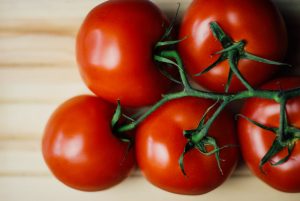By Breanna Kendrick
 The abundance of rain in Florida over the past two weeks has brought concerns about bacterial disease issues for farmers. Gary Vallad, University of Florida associate professor of plant pathology and associate center director at the Gulf Coast Research and Education Center, discusses some of the precautions growers can take to make it through this rainy season.
The abundance of rain in Florida over the past two weeks has brought concerns about bacterial disease issues for farmers. Gary Vallad, University of Florida associate professor of plant pathology and associate center director at the Gulf Coast Research and Education Center, discusses some of the precautions growers can take to make it through this rainy season.
Vallad feels fortunate his area in Balm only received 1.3 inches of rainfall in the past three days. “It could’ve been a lot worse … In the past week we’ve had 1.56 inches, which isn’t bad either,” he says. “Based off what I saw on the radar, we’ve had a lot of dry air ejected into the back side of our system. That really spared us here, at least on the west coast where we experienced showers.”
A lot of the growers in Vallad’s area are wrapping up their growing season. He says downy mildew is always a big concern during rainy periods with extended cloudiness. For most crops, bacterial diseases will be a big issue, such as bacterial spot on tomatoes and peppers resulting from the rains. Vallad says bacteria were popping up on watermelons prior to the rains. “I think this bacteria on watermelons will be overshadowed by downy mildew and also gummy stem blight,” he says.
Precautions growers can take to prevent bacterial diseases are quite limited to copper-based compounds or systemic activated resistance compounds such as Actigard. Bacteria that most growers deal with on tomatoes are copper-tolerant strains, so Vallad highly recommends not using as much copper. Instead, he advises relying on plant defense elicitors such as Actigard. However, Actigard has a longer pre-harvest interval period so growers tend to use copper-based products for bacterial spot management during harvest.
Vallad recommends plants be dried out before handling them, especially during harvesting. “This helps minimize any type of postharvest issues with Erwinia and bacterial soft rots on vegetables such as tomatoes,” he says. “It looks like with the immediate forecast that things are going to dry back up to normal in Balm. But it’s going to be hot and humid, so summer’s here early and growers should start to get prepared for the bacterial issues that will be popping up.”
Vallad’s research and Extension program focuses on diagnosing and managing diseases common to vegetable and ornamental production with an emphasis on the development and implementation of bio-based disease-management strategies.
Share this Post
Specialty Crop Grower Magazine: One Pill Kills
February 27, 2026Attention Blueberry Producers: Repeated Insecticide Sprays Needed Against Chilli Thrips
February 26, 2026Specialty Crop Grower Magazine: Building Tech Tools Growers Can Use
February 26, 2026Decision Time for Alabama Citrus Producer
February 26, 2026









